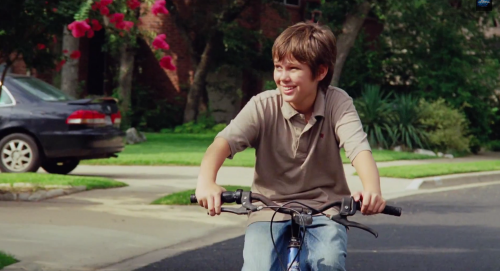Growing Up, by Reed Lackey
20 Jan
For about six months now, I’ve been trying to figure out what the big deal is about Boyhood. I had heard about the inventive filmmaking technique (segments filmed once a year for twelve years so that the actors age with the story), and that concept thrilled and fascinated me. I’ve enjoyed most of director Richard Linklater’s other works– particularly his Before trilogy of movies with Ethan Hawke and Julie Delpy– and the initial critical praise was overwhelmingly positive.
But as I exited the theater, I found myself firmly in the camp of “Well, that was interesting…” I hadn’t been terribly wowed; I hadn’t cried; I hadn’t even been left with a great deal of provocative moments to ponder. Even as I write this, I struggle to recall individual moments that impacted me beyond a nod of my head or a smile of recognition as I watched the actors move through their fictional lives and the boy become a man.
I tried to look back at my own life and my own experiences in an effort to connect more profoundly with this film that I admired more for its effort than for its result. I tried to analyze the characters as they shift back and forth between comfort and restlessness, security and doubt, confidence and despair with such sudden and sharp edits. I tried to apprehend the scope of the narratives in each “year” the film presents and tried to catch the rhythm of the various plot lines– several of which never resolve; they simply stop.
And that’s when it hit me. That’s what I think the big deal might be. And if I’m correct, then not only am I catching up with hundreds of thousands of critics and viewers who got there before me, but I might just join the movement for trumpeting how important this film is.
Alfred Hitchcock– a man who knew a thing or two about how to make a good film– once said “What is drama but life with the dull bits cut out.” And as I look back on my life, I see more than a wheelbarrow full of “dull bits”. I see countless moments, events, and conversations which would no doubt strike the objective observer as a non-stop “snooze fest”. I recall several observations of people’s behavior that, even when viewed from the perspective and maturity of a man in mid-thirties, strike me with confusion and puzzlement. And perhaps most alarming and fascinating is that I have memory after memory of people who once held daily influence and interaction in my life that at some point, through either distance or disruption, fell out of touch with me completely.
Boyhood breaks Hitchcock’s old rule and refuses to cut the dull bits out. Instead, it embraces them. This is not to say that Boyhood is boring, because at times it is extremely captivating. But I spent my time as an audience member constantly asking myself, “Ok, when are they now?” or “Wow, look, I remember when that technology came out.” I even found myself land marking the scenes based on when the song they were using came out. And the constants in Boyhood, besides the boy named Mason himself, are the Dad, the Mom, and the Sister, who emerge in each new scene less as a fluid continuation of where we last saw them than as an abrupt intrusion into where we are, striking us at first with little more than the thought, “My goodness, how they’ve changed…”
The experience of watching this movie feels so much like reviewing scenes from my own life that it’s downright eerie. This is not because my experiences were identical to Mason’s, but because the way I remember them is nearly identical to how Mason’s story unfolds for us.
This recognition has proved highly valuable to me. It helps to know that sometimes in life plot lines don’t fully resolve in a neat little dot. It helps to know that sometimes there are temporary intersection points with people and places that may not be much more than that, even if they impact us greatly at the time. And oddly enough, it brings me some comfort to remember that the only things in life which never really change are either divine or deceased.
That thought helps me not be so afraid when things change or when people drift away. We are all growing: growing up, growing out, and growing old. Places that fit us perfectly now may soon not be able to sync with who we become. We will say goodbye at least as often as we say hello, perhaps more. And let me break it to you now that when they tell you “You’ll understand when you’re older,” what they really mean is “You may never understand buddy, but you’ll come to accept that that’s okay.”
Boyhood isn’t necessarily “life with the dull bits cut out”, but it is life with the conclusions cut out. It’s a portrait of life without the baggage of forcing a point to all of it. It presents life as a point unto itself. And by doing so, it makes a rather lovely statement: that your life doesn’t have to amount to something before it matters. Your life matters simply because you’ve lived it.
So, what’s the big deal about Boyhood? I still don’t exactly know. It certainly doesn’t capture every kind of experience of growing up, — he doesn’t suffer a major death in the family or a crippling personal accident, just as an example — but it does capture pretty adequately, and accurately I might add, the experience of growing up at all. And I think that for a film to do that is pretty special. Maybe not that big of a deal, but pretty special nonetheless.




No comments yet